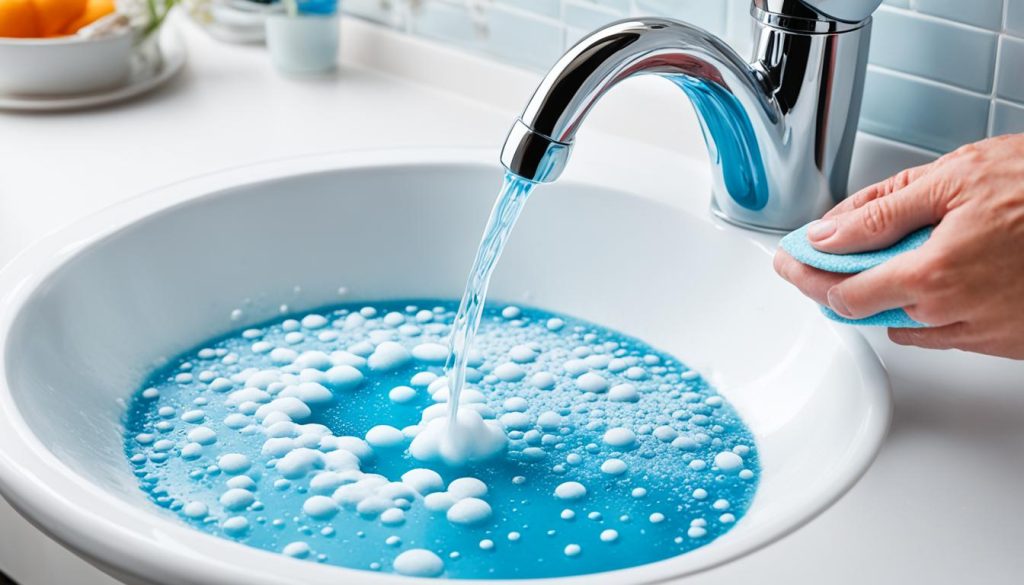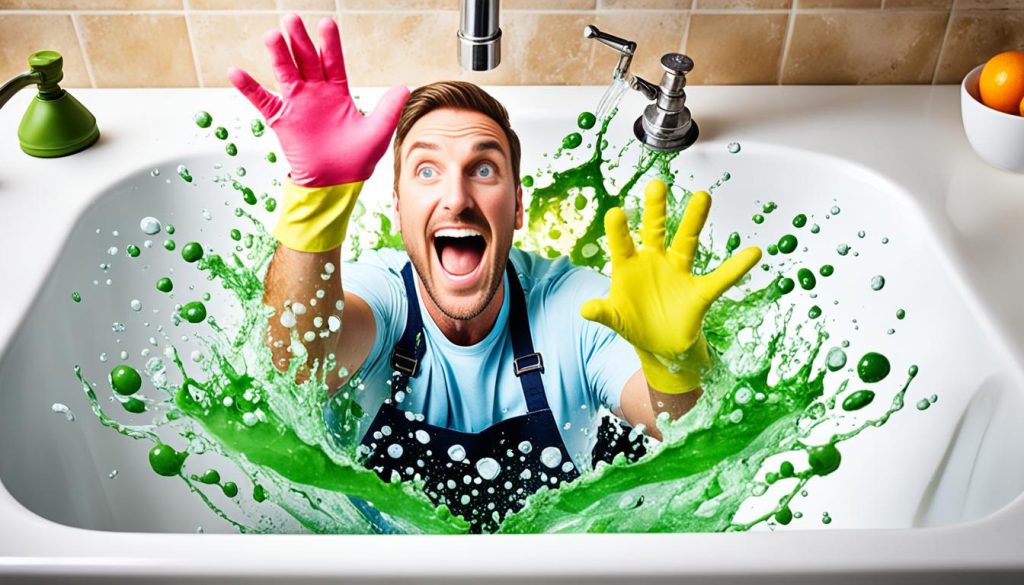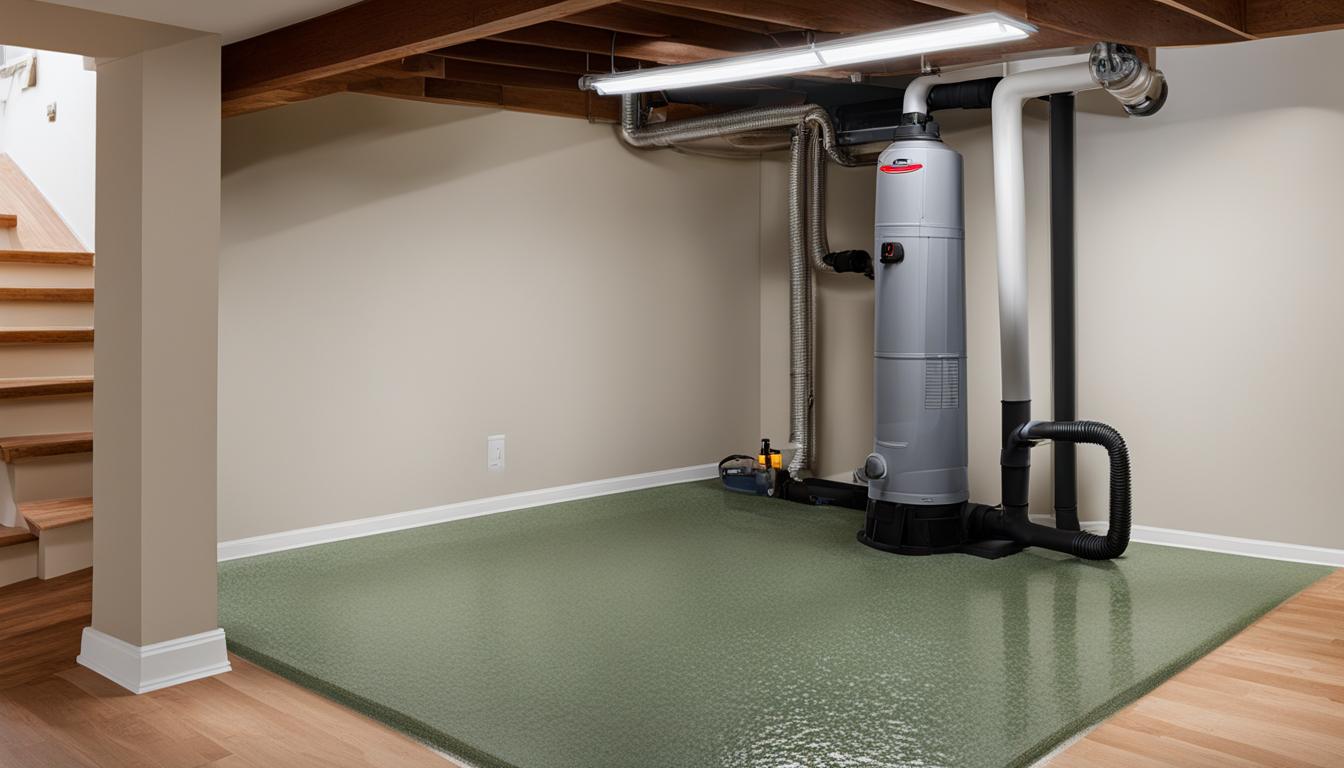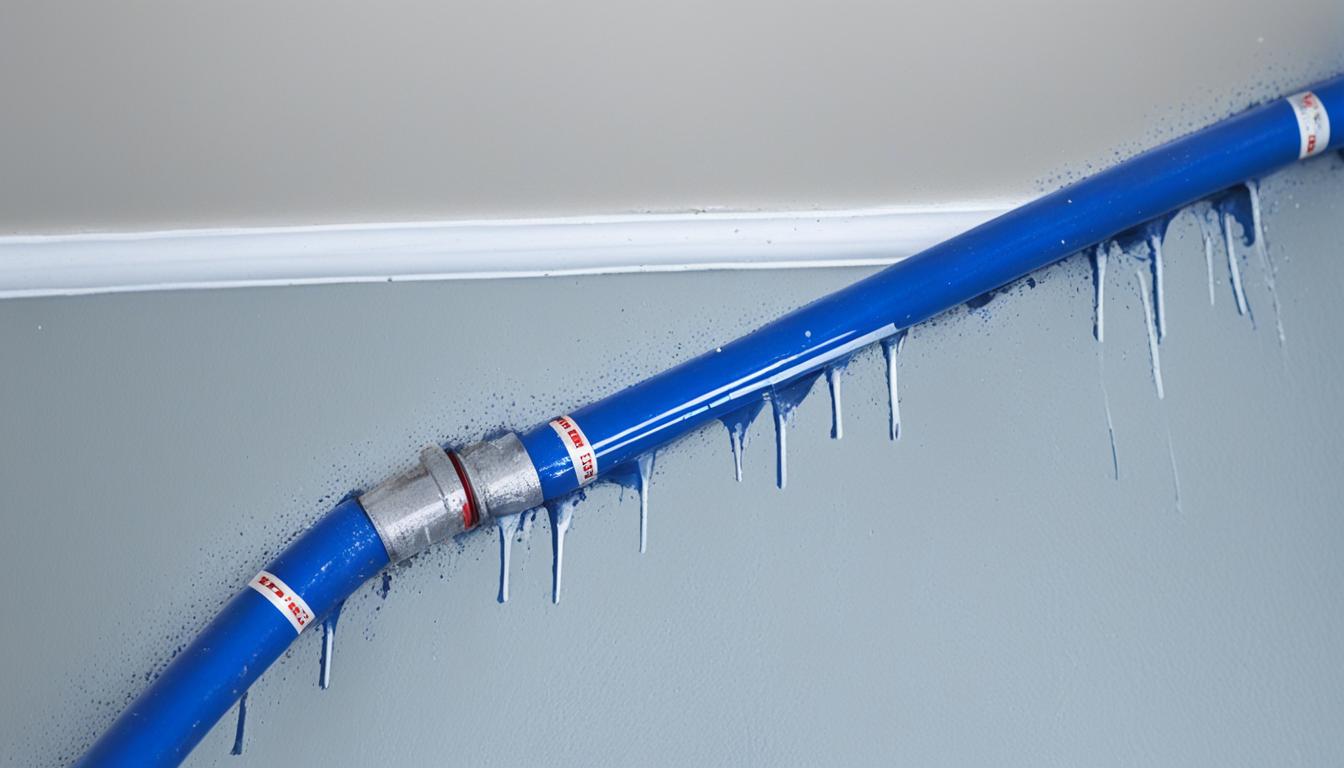Unclog Drains Naturally: Baking Soda and Vinegar
When it comes to dealing with a clogged drain, many people reach for harsh chemical drain cleaners. However, there is a natural and eco-friendly solution that you may already have in your kitchen pantry – baking soda and vinegar. These two common household ingredients have amazing unclogging abilities that can save you time, money, and the environment.
Key Takeaways:
- Baking soda and vinegar are effective and eco-friendly solutions for unclogging drains.
- By combining baking soda and vinegar, you can break up minor clogs and clear your drains.
- Boiling water can be used in conjunction with baking soda and vinegar to flush out the loosened clog.
- The bubbling reaction between baking soda and vinegar helps to loosen and break up the drain clog.
- Regular use of baking soda and vinegar can help prevent future clogs and keep your drains clean.
How to Unclog Your Drain with Baking Soda and Vinegar
To unclog your drain using baking soda and vinegar, follow these simple steps:
- Pour a pot of boiling water down the drain to help loosen any debris.
- Mix a cup of baking soda with a cup of water or vinegar and pour it into the drain.
- Cover the drain and wait for 5 to 10 minutes to allow the baking soda and vinegar to work on the clog.
- Finally, pour boiling water down the drain again to flush out the loosened clog.
This combination of baking soda and vinegar helps to break up the clog and remove it from the pipes. The foaming action created by the reaction between baking soda and vinegar helps dislodge the debris, while the boiling water helps to flush it away.
Using homemade drain cleaner made with baking soda and vinegar is a cost-effective and eco-friendly way to clear clogged drains. It is important to note that while baking soda and vinegar can be effective in clearing minor clogs, more stubborn clogs may require the use of a stronger drain cleaner like Liquid-Plumr.
| Pros | Cons |
|---|---|
| Environmentally friendly | May not be effective for tough clogs |
| Chemical-free | Requires some waiting time |
| Cost-effective | May not prevent future clogs |
The Science Behind Baking Soda and Vinegar Drain Cleaning
In this section, I’ll explain the fascinating science behind using baking soda and vinegar to unclog drains. Let’s dive in!
When it comes to drain cleaning, baking soda and vinegar are a dynamic duo. Baking soda, also known as sodium bicarbonate, is a base, while vinegar is an acid. When these two ingredients come into contact, a chemical reaction occurs, resulting in the production of carbon dioxide and water.
This reaction is what causes the bubbling effect that you may have observed when using baking soda and vinegar to clean your drains. The carbon dioxide released during the reaction creates bubbles, which help to loosen and break up the clog in your pipes.
To make the most of this reaction, it’s important to pour boiling water down the drain after the baking soda and vinegar mixture. The hot water adds pressure to the pipes, helping to flush away the loosened material and clear the clog effectively.
Now that you understand the science behind it, you can see why baking soda and vinegar are popular choices for natural drain cleaning. This eco-friendly method offers an effective solution for dealing with minor clogs without resorting to harsh chemicals.
To help you visualize the process, here’s a table summarizing the steps involved in using baking soda and vinegar to unclog your drain:
| Steps to Unclog Your Drain with Baking Soda and Vinegar |
|---|
| 1. Pour boiling water down the drain |
| 2. Mix a cup of baking soda with a cup of vinegar or water |
| 3. Pour the baking soda and vinegar mixture into the drain |
| 4. Cover the drain and wait for 5 to 10 minutes |
| 5. Pour boiling water down the drain again to flush out the loosened clog |
Remember, while baking soda and vinegar can be effective for minor clogs, tougher clogs may require the use of a stronger drain cleaner like Liquid-Plumr. In the next section, we’ll explore the benefits of using baking soda and vinegar as a drain cleaner and discuss when it’s best to turn to commercial products.
Now that you know the science behind it, let’s move on to the benefits of using baking soda and vinegar as a drain cleaner. Stay tuned!
Benefits of Using Baking Soda and Vinegar as a Drain Cleaner
Using baking soda and vinegar as a drain cleaner offers numerous benefits. Not only is it a natural and chemical-free solution, but it is also an eco-friendly alternative to harsh chemical drain cleaners. By opting for a natural drain cleaner, you can contribute to a cleaner and healthier environment.
Regular use of baking soda and vinegar can help prevent future drain clogs by effectively keeping the drains clean. The combination of these two ingredients helps break down and remove debris, grease, and residue that may cause blockages in the pipes.
While baking soda and vinegar are effective for most minor clogs, it is important to note that they may not be sufficient for tougher clogs that require immediate resolution. In such cases, a stronger drain cleaner like Liquid-Plumr may be necessary.
Switching to a natural drain cleaner, such as baking soda and vinegar, not only benefits you but also helps protect the environment. By embracing eco-friendly alternatives, you can contribute to a healthier planet for future generations.
Benefits Summary:
- Natural and chemical-free solution
- Eco-friendly and environmentally conscious
- Regular use helps prevent future clogs
| Traditional Drain Cleaners | Natural Drain Cleaner (Baking Soda and Vinegar) |
|---|---|
| Contain harsh chemicals | Chemical-free |
| Potentially harmful to health and the environment | Eco-friendly and safe |
| May cause damage to pipes and fixtures | Gentle on pipes and fixtures |
| Strong, unpleasant odor | Leaves behind a fresh scent |
Cleaning Tough Drain Clogs
When it comes to dealing with tough drain clogs, Liquid-Plumr is the go-to solution. With its powerful liquids and innovative formula, Liquid-Plumr is designed to tackle even the most stubborn clogs.
Unlike homemade solutions, Liquid-Plumr’s deep-cleaning foam can effectively dissolve hair and other clogs throughout the pipes. The secret lies in its active ingredients, sodium hydroxide and sodium hypochlorite, which work together to release heat and break down blockages.
By using Liquid-Plumr, you can say goodbye to the frustration and hassle of dealing with tough drain clogs. Whether it’s a hair clog or a stubborn buildup, Liquid-Plumr has the power to clear it away and restore your drains to their optimal condition.
With Liquid-Plumr, you don’t need to worry about using harmful chemicals or damaging your pipes. Its formula is specially engineered to be safe for all types of plumbing systems, making it a reliable and efficient option for tough drain clogs.
When DIY remedies fall short, trust Liquid-Plumr to get the job done. Its proven effectiveness and ease of use make it a must-have item for every household.
| Benefits of Liquid-Plumr: |
|---|
| – Effectively tackles tough drain clogs |
| – Powerful formula dissolves hair and other clogs |
| – Safe for all types of plumbing systems |
| – Easy to use and convenient |
Prevention and Maintenance Tips
When it comes to preventing clogs and maintaining clean drains, there are a few simple tips that can make a big difference. First and foremost, using a drain strainer or stopper can help catch debris and prevent it from going down the drain in the first place. By trapping hair, food particles, and other materials, a strainer or stopper acts as a barrier against clogs.
In addition to using a drain strainer, regular maintenance is key. Pouring hot water down the sink once a week can help dissolve grease and other debris that may accumulate in the pipes. Hot water acts as a natural cleaner, flushing away potential clog-causing substances. It’s a quick and easy step that goes a long way in keeping your drains clear.
When it comes to cooking, it’s important to avoid pouring oil or grease down the drain. These substances can solidify and create stubborn clogs. Instead, dispose of them in the trash or recycle them appropriately. If you have a garbage disposal, running a steady flow of cold water while using it will help flush away fats and oils, reducing the risk of clogs.
Another helpful tip for maintaining clean and odor-free drains is to use baking soda on a regular basis. Sprinkling baking soda down the drain and following it with hot water helps keep your pipes clean and fresh. Baking soda is known for its absorbent and deodorizing properties, making it a natural choice for maintaining healthy drains. For added grease-fighting power, you can also use a grease-fighting dish soap to cut through oil and grime.
- Investing Wisely: How Windows & Doors in Boost Property Value and Financial Health - April 24, 2025
- The Financial Impact of Personal Injuries: Why Legal Help Matters for Business Owners - April 16, 2025
- The Hidden Financial Costs of Domestic Assault: What Business Owners Need to Know - April 16, 2025














